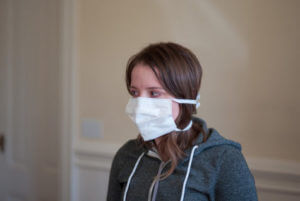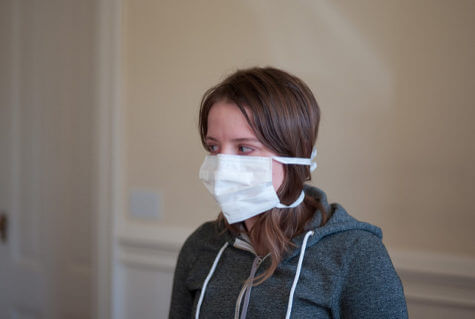COLLEGE PARK, Md. — Avoiding people who are coughing and sneezing during the flu season is difficult enough, but now scientists from several universities have found that the influenza virus can spread just by breathing, too.
The flu typically spreads via aerosol droplets in the air that hang around for long periods. Most people are aware that sneezing and coughing can spread these droplets and endanger uninfected people. But researchers, led by the University of Maryland’s Dr. Donald Milton, found high quantities of the flu virus in the exhaled breath of those infected.

“We found that flu cases contaminated the air around them with infectious virus just by breathing, without coughing or sneezing,” explains Dr. Milton in a university news release. “People with flu generate infectious aerosols (tiny droplets that stay suspended in the air for a long time) even when they are not coughing, and especially during the first days of illness. So when someone is coming down with influenza, they should go home and not remain in the workplace and infect others.”
For the study, the researchers recruited 142 people diagnosed with the flu. They tested for flu viruses in the subjects’ natural breath, spontaneous coughing, sneezing, and prompted speech. The participants provided a total of 218 nasopharyngeal swabs and 30-minute samples of spontaneous coughing, exhaled breath, and sneezing on the first, second, and third days after symptoms showed.
The results also showed, surprisingly, that coughing is not necessary for the transmission of the virus. Flu droplets were still found in about half of the aerosol samples taken without a participant coughing. The few sneezes recorded by the research team also didn’t show higher viral RNA copies in coarse or fine aerosols, showing that sneezing isn’t as large of a factor in airborne transmission as previously thought.
“The study findings suggest that keeping surfaces clean, washing our hands all the time, and avoiding people who are coughing does not provide complete protection from getting the flu,” says co-author Sheryl Ehrman, dean of the college of engineering at San José State University. “Staying home and out of public spaces could make a difference in the spread of the influenza virus.”
The researchers hope that their findings will eventually lead to better public health interventions and safety precautions in the future, as well as more accurate mathematical models for how fast the virus spreads.
The full study was published in the Proceedings of the National Academy of Sciences of the United States of America.

Yes, us contract workers that are paid hourly and have no paid time off can’t afford to stay home. There is a big problem in this country with using people as commodities for profit with no benefits. It should be illegal to have such practices. Contract agencies have too big of an advantage and companies that care about their employees have benefits but workers along side doing the same job contract have nothing. No healthcare (Offered but costs out of site and covers nothing) no sick time off, no vacation pay. It sucks, especially if you are over 50. The job market is discriminatory as well. You cannot prove the age discrimination but it is there. Thus, we go to work sick because otherwise we don’t pay bills.
” Dr. Milton in a university news release. “People with flu generate infectious aerosols (tiny droplets that stay suspended in the air for a long time) even when they are not coughing, and especially during the first days of illness. So when someone is coming down with influenza, they should go home and not remain in the workplace and infect others.”
Why don’t you lobby for sick-leave for US hourly employees? Since greedy corporations(piles of money owned by ultra rich) have been able to screw over US workers and pocket that expense to their already obscene profits, most workers in America cannot afford to miss work, otherwise they will not have the rent or food for their family.
Must be nice having that government education/research grant job, you got paid sick leave. You state a stupid answer that totally misses the actual problem with flu and contagious diseases in America.